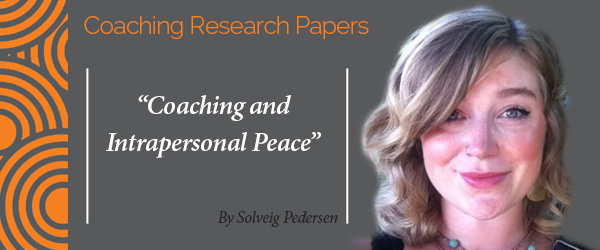
Peace. It does not mean to be in a place where there is no noise, trouble, or hard work. It means to be in the midst of those things and still be calm in your heart. -Unknown
Introduction
The aspect of life coaching that I find particularly compelling is the way dialogue impacts our reality. As a former Communication graduate student, with a passion for peace studies, I discovered the theoretical perspective referred to as the social construction of reality. Developed by Berger and Luckmann (1966), the social construction of reality posits that humans develop and understand reality through interaction with other humans; in their words,
all human knowledge is developed, transmitted, and maintained in social situations (p. 15).
In graduate school, I applied this theoretical perspective to understandings of the concept of nonviolence, and this interest in how we create positive social change through conversation has continued to intrigue me. After several years of teaching university-level Communication courses, I discovered life coaching (or coaching, in general), and have been thrilled with the connection between disciplines. Exploring how people grow and change through interaction is exciting. The International Coaching Federation defines coaching as
partnering with clients in a thought-provoking and creative process that inspires them to maximize their personal and professional potential (Coaching FAQs, para. 1).
Coaching, which involves supporting others through powerful conversations, seemed a natural transition for me after study in a discipline which asserts that
communication is central to all human experience (Littlejohn, 2002, p. 6).
This paper combines my interest in life coaching, communication, and peace studies by exploring the implications of coaching as a form of powerful conversation that leads to human connection, increased personal peace, and potentially, by extension, to a more peaceful world.
What is Peace?
The term peace is used in many contexts, and has a variety of nuanced meanings. The first three definitions for peace in Merriam-Webster’s Dictionary are
a state of tranquility or quiet; freedom from disquieting or oppressive thoughts or emotions; harmony in personal relations.
A review of peace studies literature indicates several working definitions of peace, referring to it on macro and micro scales. Peace researcher Galtung (1985) developed the concepts of negative and positive peace in an effort to explain peace in a global context. While negative peace refers simply to an absence of violence, positive peace describes a paradigm for a peaceful state—one that not only is without violence, but also includes harmony, cooperation, social justice, and a culture of peace. The concept of positive peace is useful when considering the present topic, as it implies not only a state of tranquility with harmony in relationship to self, but also an active, dynamic state of health and wellbeing. With this perspective of peace in mind, the concept of intrapersonal peace further defines my vision of peace as it relates to coaching.
What is Intrapersonal Peace?
To heal the world, I must see that peace begins with me (Lee, Track 1)
Intrapersonal peace is peace inside oneself. Peace theorist Hanh (2003) writes,
to practice peace, to make peace alive in us, is to actively cultivate understanding, love, and compassion, even in the face of misperception and conflict (p. 1).
Hanh’s proposition of cultivating understanding, love, and compassion as a way to create more intrapersonal peace relates to Galtung’s positive peace, or striving for a harmonious relationship with self. I propose there are three vital elements of intrapersonal peace that coaching can help develop: presence, resilience, and wholeheartedness.
Coaching and Intrapersonal Peace
If we explore intrapersonal peace (peace within oneself) as presence, resilience, and wholeheartedness, we can examine how coaching supports these states of being. Coaching often consists of helping a client develop more self-awareness, and eventually, action steps for moving forward and making progress in life. In partnership, through utilizing coaching techniques such as powerful questioning, reflecting, and reframing, clients discover narratives, or stories, that they tell themselves about their lives as well as their underlying beliefs, and often develop clarity around their personal values. As clients gain more clarity about themselves, they may also find increased presence, resilience, and wholeheartedness.